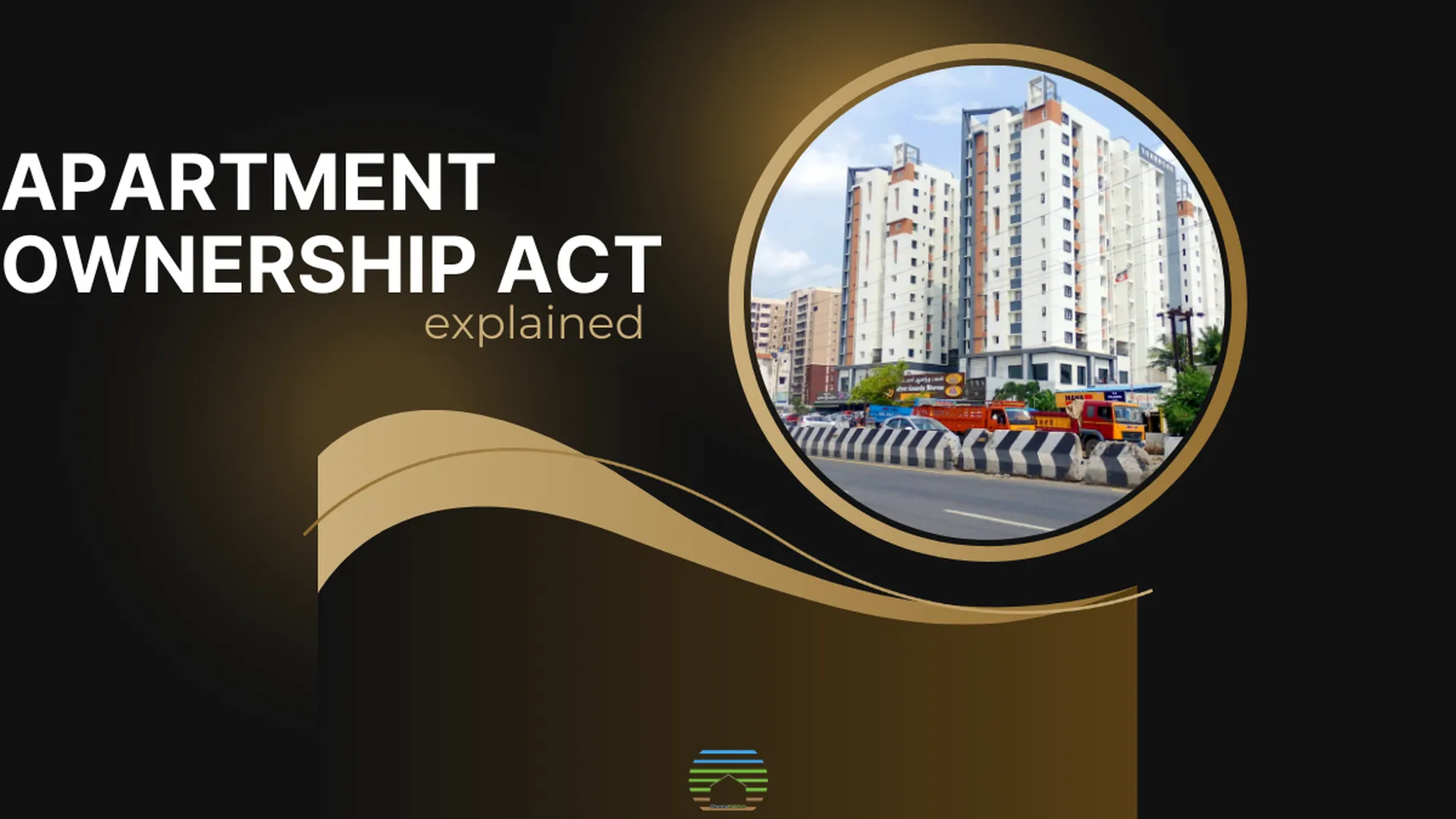This Act is a very important piece of legislation that governs the ownership, maintenance, management, and rights of apartment owners in Tamil Nadu. Act No 7 of 1995 An act to provide for the ownership of an individual apartment in a building and to make such apartment heritable and transferable immovable property.
Overview and Objective
The Tamil Nadu Apartment Ownership Act, 1994 was enacted to:
- Provide a legal framework for owning individual apartments in a building.
- Regulate common property ownership among apartment owners.
- Ensure proper maintenance and management of apartment complexes.
- Facilitate formation of associations for smooth administration and collective decision-making.
Prior to this Act, apartment dwellers often faced legal ambiguity regarding ownership rights, maintenance responsibilities, and division of common property. This Act provides clear legal titles, defined rights and duties, and collective governance for apartment buildings.
Structure of the Act
The Act consists of several key sections that cover:
- Short title, extent, and commencement
- Definitions
- Ownership and transfer of apartments
- Common areas and facilities
- Deeds and registration
- Formation and functioning of associations
- Insurance, maintenance, and other responsibilities
- By-laws and rules
- Miscellaneous provisions
Key Definitions
The Act defines several important terms:
| Terms | Meaning |
| Apartment | a part of the property intended for independent use ( eg a flat or unit ) with access to common areas. |
| Associate of Apartment owner | A group formed by all apartment owners to manage and maintain common areas. |
| Common Areas and Facilities | Includes land, foundations, roofs, corridors, lifts, staricase. water tanks, parking areas, etc |
| Common Profits | Income derived from common area ( eg rent from common hall, advertisemnt space) |
| Common Expenses | Maintenance costs, repair expenses, insurance, etc shared among apartment owners |
| Competent Authority | The authority designated by the Government to implement the act. |
Ownership of Apartments
- Each apartment is treated as a heritable and transferable property, meaning it can be:
- Sold,
- Leased,
- Gifted,
- Inherited, or
- Mortgaged.
- Ownership is exclusive to the apartment but undivided interest exists in the common areas.
- The undivided interest in common areas is proportionate to the carpet area of the apartment.
Example:
If an apartment covers 1,000 sq. ft. in a 10,000 sq. ft. building, the owner has:
- Exclusive ownership of 1,000 sq. ft. apartment, and
- 10% undivided share in the land and common areas.
Registration and Deed of Apartment
- The promoter (builder) or the owner must execute a Deed of Apartment for each flat.
- This Deed must include:
- Description of the apartment,
- Percentage of undivided interest in common areas,
- Purpose and use (residential/commercial),
- Rights, restrictions, and conditions.
- The Deed must be registered under the Registration Act, 1908.
- This ensures clear title and transparency for all apartment owners.
Common Areas and Facilities
The Act provides that common areas cannot be sold separately. They are jointly owned by all apartment owners.
Common areas include:
- Land on which the building stands,
- Foundations, halls, lobbies, corridors, stairways, lifts,
- Common basements, water tanks, and pipelines,
- Central installations (heating, water supply, power supply),
- Parking areas (unless individually owned),
- Gardens, playgrounds, etc.
Responsibilities:
- All owners must share maintenance costs in proportion to their ownership.
- No owner can alter common areas without consent.
Association of Apartment Owners
Formation:
- All apartment owners automatically become members of the Association upon registration of their Deed.
- The Association is registered under the Tamil Nadu Societies Registration Act, 1975.
- It has a bye-law to manage common affairs.
Functions:
- Maintenance and repair of common areas.
- Collection of monthly/annual maintenance fees.
- Insurance of building and common areas.
- Framing rules for proper use of facilities.
- Representation before local authorities.
Management:
- Managed by an elected Board/Committee.
- Each apartment owner has one vote.
- Decisions on major issues (e.g., redevelopment, sale of common areas) require a majority vote or unanimous consent depending on the nature of the issue.
Common Expenses and Funds
Each owner must contribute to:
- Common maintenance expenses,
- Utility charges (for common facilities),
- Reserve fund for major repairs,
- Insurance premium.
Non-payment of dues can lead to:
- Legal recovery by the Association,
- Restrictions on facility usage,
- Penalty as prescribed by bye-laws.
Insurance
- The building and common areas must be insured against:
- Fire,
- Natural disasters,
- Structural damage, etc.
- Premiums are paid collectively by apartment owners.
Alterations and Additions
- No structural alteration affecting other apartments or common areas is allowed without the consent of all owners.
- Individual internal alterations may be made with due permission from local authorities.
Bye-Laws
The Act requires that every Association adopt bye-laws, which include:
- Maintenance and repair rules,
- Voting rights and quorum for meetings,
- Calculation of maintenance charges,
- Rules for use of common areas,
- Dispute resolution mechanisms.
These bye-laws must be filed with the Competent Authority.
Role of the Competent Authority
The Tamil Nadu Government appoints a Competent Authority to:
- Supervise implementation of the Act,
- Register associations and apartment deeds,
- Resolve disputes when necessary.
Legal Protections and Disputes
- The Act provides legal recognition of apartment ownership.
- Owners can approach the Competent Authority or Civil Court for grievances regarding:
- Non-maintenance of property,
- Violation of common rights,
- Disputes among owners or with builders.
Builder/Promoter Obligations
Before handing over possession, the builder must:
- Register the Deed of Apartment for each unit.
- Hand over title documents, plans, and common area records to the Association.
- Facilitate formation of the Association.
Failure to comply can lead to legal action by owners.
Comparison with Other Laws
- The Tamil Nadu Apartment Ownership Act, 1994 works alongside:
- Tamil Nadu Ownership Flats Act, 1997 (deals with promoter obligations),
- Real Estate (Regulation and Development) Act, 2016 (RERA) (governs registration and transparency of projects).
Together, these ensure transparency, accountability, and protection for apartment owners.
Conclusion
The Tamil Nadu Apartment Ownership Act, 1994:
- Legalizes individual ownership of apartments with undivided interest in common areas.
- Promotes collective management through registered associations.
- Ensures fair division of responsibilities, maintenance, and rights.
- Creates a structured system to resolve disputes and safeguard owners’ interests.
In short, the Act is a comprehensive legal framework that transforms apartment living from informal arrangements into a well-regulated, ownership-based system ensuring harmony, accountability, and sustainability.
https://www.livehomes.in/blogs













